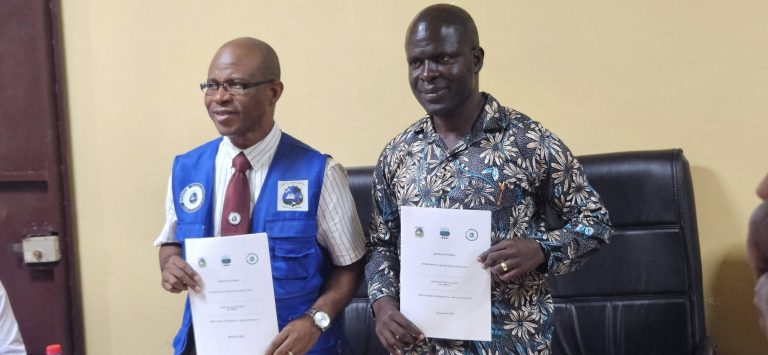Posts Categories
Latest Posts

(Monrovia, Liberia, January 8, 2025)– In an effort aimed at moving to protect public health and the environment, the Environmental Protection Agency (EPA) of Liberia and the National Public Health Institute of Liberia (NPHIL) have officially signed the Lead Paint Regulations.
The signing ceremony held on Wednesday, January 8, 2024, at the EPA’s conference hall, brought together representatives from both institutions and other stakeholders.
The regulation limits the lead content in residential and decorative paints to 90 parts per million (ppm), aligning with ECOWAS standards, and aims to eliminate the production, sale, and importation of lead-based paints in Liberia within three years.
Mr. Jerry Toe, Focal Point for the Lead Paint Regulation, in his opening remarks, described the regulation as a major achievement. “This is not just a regulatory milestone but a testament to the collaborative efforts of stakeholders who have worked tirelessly to protect public health,” he said.
Mr. Toe highlighted that lead exposure remains a critical public health challenge in developing countries like Liberia.
Giving the overview of the regulations, Mr. Rafael Ngumbu, EPA’s Manager of Environmental Research and Radiation Safety, provided an overview of the regulation’s development. He noted that stakeholder consultations began in August 2019, leading to the formation of a technical working group in 2021.
He said a study conducted by a UK team revealed dangerously high lead levels in locally produced paints, prompting urgent action.
Mr. Ngumbu further explained that the regulation follows Liberia’s
Environmental Management Law, which mandates collaboration between EPA, NPHIL, and other agencies to develop standards aimed at reducing environmental hazards.
Speaking during the signing ceremony, Dr. Emmanuel King Urey Yarkpawolo, EPA’s Executive Director, emphasized the devastating impact of lead exposure on human health, particularly children and pregnant women.
“Lead poisoning causes irreversible damage to the brain and nervous system, decreases IQ, and increases the risk of behavioral problems,” he explained.
He thanked the Liberian government, NPHIL, and international partners like the Lead Exposure Elimination Project (LEEP) for their support in drafting and implementing the regulation.
Dr. Urey Yarkpawolo noted that lead in paint is a significant source of exposure, especially as paints decay and release toxic dust and flakes into the environment.
He assured the public of the EPA’s commitment to strict implementation, including testing paint samples, creating awareness, and supporting manufacturers in transitioning to lead-free production.
For his part, the Director General of National Public Health Institute of Liberia (NPHIL), Dr. Dougbeh Chris Nyan described the signing as a “historical milestone” and stressed the importance of enforcing the regulation.
“This is not just another signing ceremony. It’s about ensuring that our enforcement teams go out and monitor compliance, especially among manufacturers producing lead-based paints,” Dr. Nyan stated.
Dr. Nyan also highlighted the collaboration between EPA and NPHIL as a model for inter-agency cooperation, ensuring that public health and environmental protection are addressed holistically.
“As President Boakai has said, this will not be business as usual. Implementation and enforcement will be key,” he added.
The EPA, in partnership with LEEP, plans to expand studies on lead content in paints, raise public awareness, provide technical advice to manufacturers for reformulating paints, and monitor compliance.
The signing of the Lead Paint Regulations signifies a shared commitment by EPA, NPHIL, and partners to create a healthier and lead-free Liberia. This milestone aims to eliminate a significant source of human exposure to lead, safeguarding public health and ensuring a cleaner environment for future generations.
National Public Health Institute of Liberia-NPHIL

